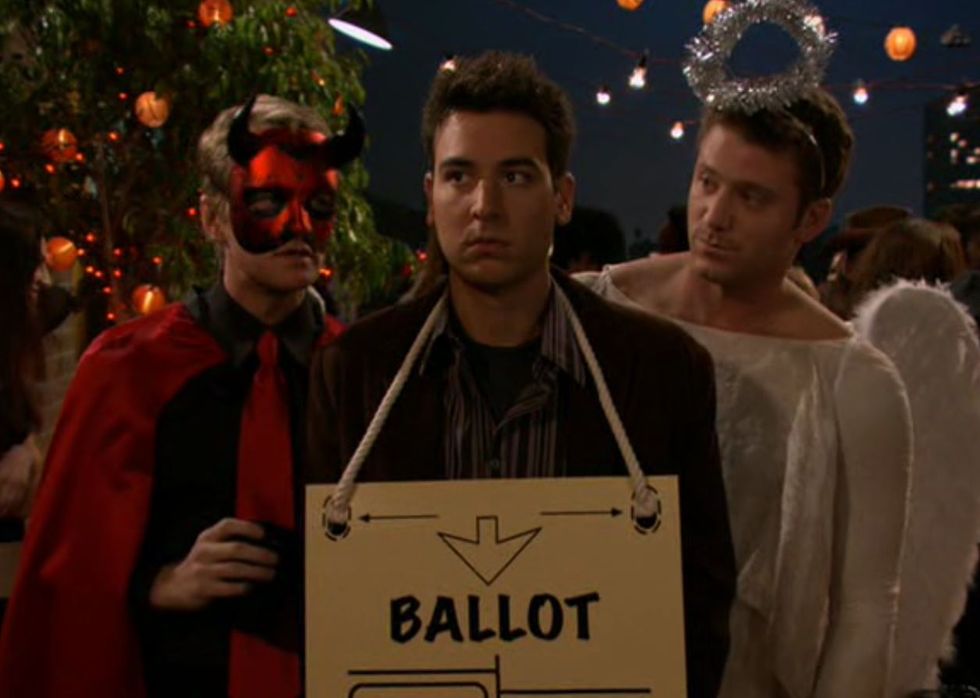Just recently, Molly Ringwald, of “Sixteen Candles” and “The Breakfast Club” released an opinion piece about the problematic aspects of many John Hughes cult classic films in the #MeToo movement. In her essay for The New Yorker, she attempts to reconcile the massive cultural and personal impact the films had on so many people with the recurrent instances of sexual harassment, rape and verbal abuse within them.
Incredibly well written, this essay made me think critically about some of my favorite films and TV shows and the issues within them. It brought up problems I had been pushing aside for years so that I could enjoy my entertainment unhindered, and this time, in this culture, I couldn’t ignore them.
When I was 13, my favorite show was “How I Met Your Mother.” My family had just gotten Netflix and I would binge watch five episodes at a time with the volume muted and subtitles on at ten o’clock at night, because my parents didn’t approve. I loved everything about the show: its premise, its characters and in my little eighth-grader mind I thought it was the coolest thing ever. It was funny while still being emotionally poignant, and seeing Neil Patrick Harris, an openly gay actor, holding a major role in a popular TV show was so important to me at a time in my life when I was struggling with my own sexuality.
But as I’ve grown older I’ve become more aware of the rampant sexism, homophobia and rape culture within the show. I’ve tried watching a few episodes recently and sure, it’s funny and I can certainly still see the appeal, but it’s a lot harder to ignore jokes about tricking drunk girls into having sex when you’re 19 and that’s a very real issue in society. As I get older, it gets harder and harder for me to speak out against all these issues and then turn around and watch an episode where Barney tries to seduce a lesbian without me feeling like a hypocrite.
Is it just destiny that we learn to hate the very things that made us feel alive when we were younger, or can I truly forgive something with such unforgivable issues? Even if I could, should I? Maybe that’s part of growing up: we gain different perspectives on the world and sometimes that means seeing something for what it truly is.
Just recently, I re-watched another one of my favorite movies, “Dr. Horrible’s Sing-Along Blog,” and I found many of the same problems. A nerdy and antisocial guy trying to win the love of a girl away from “the jerk,” Dr. Horrible is the quintessential “nice guy” that everyone hates. Maybe the reason Penny didn’t love him and picked Captain Hammer was that Captain Hammer actually engaged in her interests instead of obsessing over how to win her over like some trophy. The fact that in 2008, four years before Sandy Hook happened and started the awful spiral of shootings and violence that we have yet to emerge from, there was a movie that displayed someone resorting to violence and murder because they felt like they “deserved” something is an ominous indicator of the predictability of society’s demons.
However, I can’t help but notice that “Dr. Horrible’s Sing-Along Blog” has fared a much better fate than “How I Met Your Mother.” Is the latter just that much more problematic, or do we, for all our claims of activism still pick and choose what we want to critique? After all, while “How I Met Your Mother” was just a sitcom, “Dr. Horrible’s Sing-Along Blog” achieved cult status almost overnight, not to mention it addressed some very poignant issues along the way. And let’s face it: a superhero musical? It’s hard to hate something we want to love so much.
So when Ringwald concludes that it’s okay that her films are still revered as much as they are, as long as we’re cognizant of their issues, I wonder if we’d be having a different conversation if we were talking about “Home Alone 3” and not “The Breakfast Club.” Sometimes it’s easy to blur the line between a conclusion and a justification, especially if there’s an answer that deep down you know you want to hear.
Maybe entertainment can be just that — entertainment — and we’re all digging too deep and making something out of nothing, but do we tell ourselves that because we actually believe it, or are we just lying to make ourselves feel more comfortable?
















